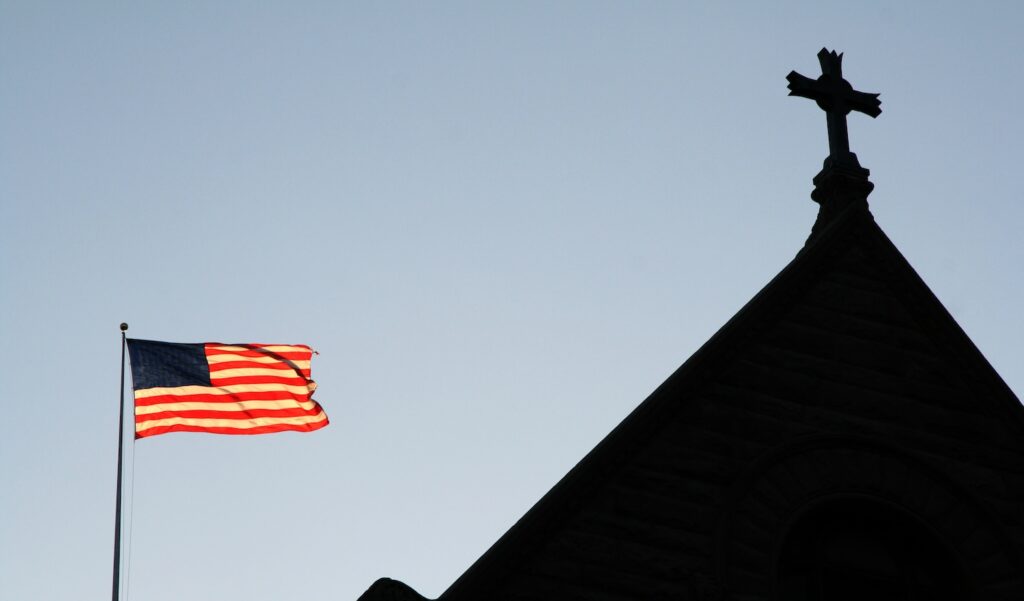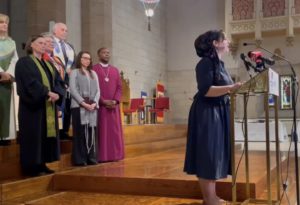Op-ed: Separation of church and state is a misunderstood myth
For decades, anti-religious watchdogs have waged war on Christianity under the guise of “separation of church and state.”
Groups such as the Freedom From Religion Foundation (run by atheists)…

For decades, anti-religious watchdogs have waged war on Christianity under the guise of “separation of church and state.”
Groups such as the Freedom From Religion Foundation (run by atheists) and Americans United for Separation of Church and State criticize prayer at school board meetings and lambast college coaches attending student baptisms.
Most recently, they’re suing the state of Oklahoma for approving a groundbreaking Catholic public charter school.
Even Oklahoma Attorney General Gentner Drummond contributed to the fearmongering by claiming a Catholic charter was just one step away from a school teaching Sharia law or Satanism.
“Muslim taxpayers will be forced to fund Jewish and Christian schools, Jewish taxpayers will be compelled to fund Christian and Muslim schools, and taxpayers of no faith will be made to fund religious schools of all faiths,” Drummond wrote in the Wall Street Journal.
The problem? Muslims, Jews and Christians are already forced to fund America’s functionally atheistic public schools.
Even setting religion aside, Americans have differing opinions on topics such as school uniforms and dress codes, corporal punishment (which is permitted in 15 states), the presence of school resource officers, or even having teachers carry firearms.
Yet no citizen is exempt from paying taxes, even if they strongly disagree with school curricula or practices.
Realistically, no single system is going to please everyone. So why not fund a diversity of schools to reflect America’s diversity of beliefs?
If Christians must fund anti-creationist science instruction, why can’t non-religious people fund a virtual Catholic school?
‘Separation of church and state’
The oft-repeated phrase “separation of church and state” is not a part of any founding document. It originated in a letter from then-President Thomas Jefferson to the Danbury Baptist Association.
The Danbury Baptists were worried about the future of religious liberty in America, and Jefferson assured them, not that religion had no place in government, but that government would not meddle with religion.
“Believing with you that religion is a matter which lies solely between Man & his God,” Jefferson wrote, “that he owes account to none other for his faith or his worship, that the legitimate powers of government reach actions only, & not opinions, I contemplate with sovereign reverence that act of the whole American people which declared that their legislature should ‘make no law respecting an establishment of religion, or prohibiting the free exercise thereof,’ thus building a wall of separation between Church & State.”
Note that the First Amendment – which Jefferson quoted – does not prevent government actors (such as school board members) from expressing their religious beliefs. It merely prohibits the government from making a law that establishes one particular religion over others.
Contrast that with the English Reformation in the 16th century, in which Catholic and Protestants fought bitterly over which denomination would be the nationally accepted and government-sanctioned religion.
And consider: If members of government were forbidden by the First Amendment from expressing any religious sentiment, how could President Biden have used phrases such as “one nation, under God,” “May God bless America,” and “God protect our troops” in his inauguration speech?
Plus, there’s the overwhelming evidence that most Americans want leaders who are at least religious, if not explicitly Christian. Virtually every U.S. president in history has been a professing Christian, and according to the Pew Research Center, the same is true of members of Congress.
Moreover, the Declaration of Independence mentions both “God” and “divine Providence,” as do most state constitutions.
So, if people are serious about separating church and state, they will have to get rid of America’s founding documents first.
The myth of religious neutrality
The idea that government should be religiously neutral is seductive. After all, the American melting pot is all about diversity and tolerance.
But when groups such as the Freedom From Religion Foundation talk about separation of church and state, what they’re really trying to do is prevent religious people from expressing their beliefs in the public sphere.
Silencing people’s sincere religious sentiments and forcing non-religion on a people is no less oppressive than mandating a particular religion.
Ultimately, every person has a set of beliefs on topics such as how the world came to exist, what mankind’s collective or individual purpose is, and the difference between moral right and wrong. These beliefs may not be the doctrine of an organized religion, but they are religious in nature.
Thus, while not all people belong to an organized religion, they all have a worldview – the functional equivalent of religion – be it materialism, secularism, hedonism, or something else entirely.
That’s why Oklahoma Superintendent Ryan Walters is so adamant that public schools not teach “state-sponsored atheism.”
Schools that cannot openly acknowledge or even abide religion are not merely a-religious, they are anti-religious.
Those who sincerely believe complete religious neutrality is possible are sincerely mistaken.



